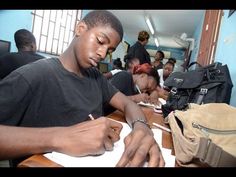
National Integrity Action Works With Communities: Part 1 – Women’s Resource and Outreach Centre
July 19th, 2017
“Corruption is basically about opportunity. And risk.”
So said Professor Anthony Harriott of the University of the West Indies during a radio interview. Those who are considering getting involved in a corrupt act weigh things up: opportunities and risks. If the former outweighs the latter, then a wrong turn can be taken, so easily. It can be a split-second decision, at the individual level, whether to offer or receive a bribe of some sort, or not, for example. But there is always a choice. Isn’t there?

Anthony Harriott, Professor of Political Sociology and Director of the Institute of Criminal Justice and Security at the University of the West Indies. (Photo: UWI)
National Integrity Action (NIA) is seeking innovative ways to tackle corrupt practices at the community level. These strategies will tip that balance in people’s minds in the right direction. It is a complex issue, and. There are no easy answers. A good way to start beginning to tackle it is to dig more deeply beneath the surface – at the community level. How do people view corruption? Do they see, or even recognise it in their daily lives?
One of the partnerships that NIA is currently engaged in is with the Women’s Resource and Outreach Centre (WROC), a non-governmental organisation that serves the Lyndhurst-Greenwich community of Kingston and beyond. The two-year project is aptly named: Strengthening a Culture of Integrity. It is the culture, you see, that is in people’s minds. The concept of integrity – doing the right thing, based on core principles – has to overwhelm that “shall I or shan’t I?” mindset. But let us face it: for many Jamaicans, trying to survive in our inner cities, this is easier said than done. That path is fraught with doubt, fear, resistance – even personal danger. Isn’t it so much easier, safer to go along with the little corruption?
WROC is not looking at whether men or women are more corrupt. There is no point in asking that question, is there? However, it will be looking at how corruption impacts women, especially in relation to obtaining access to badly needed services for home and family. What are the other issues, concerns, ways of coping in an often stressful, even hostile environment? How does corruption function in an area, where men and women alike face the threat of violence? This is what WROC will be exploring through research, focus groups, workshops and dialogue – at all times engaging the voices of the community. This will not be an academic exercise, but one that reflects those voices. They need to be heard.
On June 28, WROC launched the skills training component of the project. It was a stifling hot day in the yard of their office, which they are steadily “greening.” The Strengthening a Culture of Integrity project is not merely targeting women; WROC works with the whole community, including youth, men, fathers, seniors too. The students (ages 17 – 40 years) have access to computers, and at the launch they were urged to make use of their time and opportunity wisely: “Don’t waste other people’s time!” was the injunction. The first cohort of the 50 community members to be trained from Lyndhurst/Greenwich, Maxfield Park and Kencot attend classes at WROC in Mathematics, English and Social Studies (including civics, human rights and corruption awareness) for 24 hours a week, besides sessions on Personal Development (including gender issues, parenting and more). These young men and women (a 50/50 gender balance) are not on the job market; they are unemployed, and not enrolled in any training course. So they are virtually starting from scratch.
NIA’s Deputy Director Dr. Patrece Charles gave the young people a serious pep talk. The mother of three boys (one an adopted child) she told them some hard truths: “Life isn’t easy. You just have to appreciate and nurture what you have.” She suggested that these young people were in their own undesirable “comfort zone.” You get comfortable with having no skills. You get comfortable with gunshots ringing out. You get comfortable with no direction in your life. The former CEO of the National Parenting Support Commission told them not to feel sorry for themselves, however, because: “Nobody has time to feel sorry for you.”
In other words, Dr. Charles noted, get up and do it yourself. For yourself. “If you keep moving in the right direction, one day at a time, positive change will happen,” she added. Kimo Francis, a graduate from an earlier WROC program, supported Dr. Charles. He is now an IT lab technician and studying theology. He frankly admitted to the students: “I wasted time at Charlie Smith High School” (now merged into Trench Town Technical High School). “I did. I wasted time!” He went on to make an important point: “Don’t forget – others are watching you.”
That is how you build integrity. Keep your goals in mind, keep moving towards them; and crucially, be aware that your behaviour and actions are setting an example to others. Young people must know this. Don’t stay with the crowd in that toxic little comfort zone. Move on up!
I wish the students all the best, and believe that the WROC/NIA partnership will bear fruit and transform lives. Stay tuned!
Tags: corruption, gender equity, inner city, integrity, Kencot, Kingston, Lyndhurst/Greenwich, Mayfield Park, National Integrity Action, NGO, NIA, Patrece Charles, Professor Anthony Harriott, skills training, Strengthening a Culture of Integrity, sustainable development, training, Trench Town, University of the West Indies, Women's Resource and Outreach Centre, WROC, youth at risk
The Gleaner reserves the right not to publish comments that may be deemed libelous, derogatory or indecent.
To respond to The Gleaner please use the feedback form.
- We Are the Zoomers
- Living Online with Humans and Birds: NAOC 2020
- Human Trafficking and the Problem of Public Education
- Down Memory Lane
- Are We Ready to Recover from COVID-19?
- Road Safety Matters: Is Your Vehicle Safe?
- Sexual Harassment, Me Too, and the Minister’s Disturbing Giggle
- The Vulnerable Senior Citizens, Private Care Homes and COVID-19
- A Muddle Over Masks
- Here is Something Life-Saving You Can Do: Give Blood!




